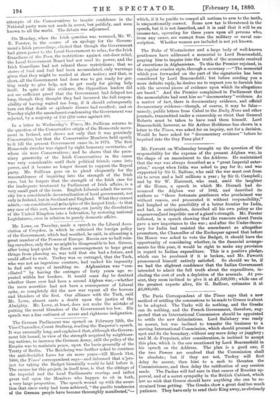Mr. Fawcett on Wednesday brought up the question of the
responsibility for the expense of the present Afghan war, in the shape of an amendment to the Address. He maintained that the war was always described as a "great Imperial enter- prise," except when India was asked to pay for it; and was supported by Sir G. Balfour, who said the war must cost from six to seven and a half millions a year ; by Sir G. Campbell;. and by Sir W. Harcourt, who read, amid the laughter of the House, a speech in which Mr. Disraeli had de- nounced the Afghan war of 1842, and described its authors as " those fortunate gentlemen who proclaimed war without reason, and prosecuted it without responsibility," had laughed at the possibility of a bettor frontier for India, and had, in anticipation, described all his own policy as the ungenerous:and impolitic use of a giant's strength. Mr. Forster followed, in a speech showing that the rumours about Persia gave a new importance to the war ; and after the Under-Secre- tary for India had resisted the amendment as altogether premature, the Chancellor of the Exchequer agreed that before the House was asked to vote the Budget, it should have the opportunity of considering whether, in the financial arrange- ments for this year, it would be right to make any provision in regard to Indian expenditure. This is a positive pledge,. which can be produced if it is broken, and Mr. Fawcett pronounced himself entirely satisfied. So should we be, if we had the slightest confidence that the Indian Government intended to admit the full truth about the expenditure, in- cluding the cost of such a depletion of the arsenals. At pre- sent, they seem inclined to give it at £1,500,000; while one of the greatest experts alive, Sir G. Balfour, estimates it at £6,000,000.


































 Previous page
Previous page